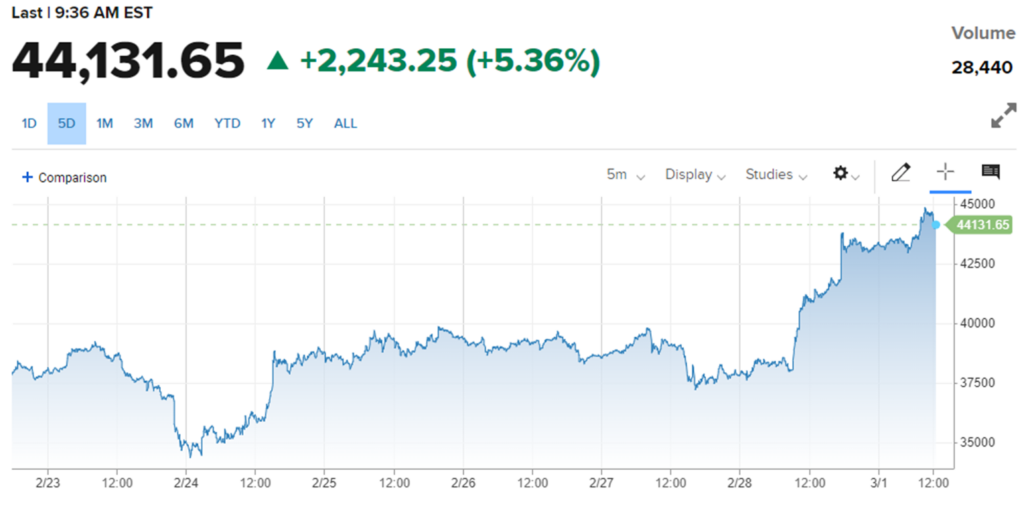Apparently, even in times of war, everything is going digital.
As economic sanctions mount on Russia following its invasion of Ukraine, its citizens seem to be looking out for ways to have their assets fluid and flowing amid the geopolitical crisis. Bitcoin started to rally as the list of countries imposing sanctions grew longer, reaching its US$40,000-mark yesterday for the first time in two weeks.
#Bitcoin (and private crypto) has been quite a sunny place for some very shady people in the last few days…
— 🇺🇸Kyle Bass🇺🇦 (@Jkylebass) March 1, 2022
Russia’s ruble has been seeing all-time lows since the conflict broke out in Eastern Europe. The country has also been frozen out of the global SWIFT system, putting a chokehold on its flow of revenue.

In a CNBC report, Mobius Capital Partners founding partner Mark Mobius said that the bitcoin rally might be due to a huge demand for cryptocurrency in the conflicted states.
“I would say that’s the reason why bitcoin has shown strength now — because the Russians have a way of getting money out, getting their wealth out,” Mobius said in an interview.
The situation is not exclusive to Russia. Fleeing Ukrainians from their country are either taking their crypto with them or trading their hryvnia for crypto assets at record levels. The Ukrainian government is even asking for crypto donations for the country, raising approximately US$24.6 million since the start of the invasion.
1/2 Crazy story,my webmaster escaping from Ukraine 2 hours before the gvnmt closes the border for men of war age,bank ATMs were blocked of course,and he who upon my advice had preloaded his hw wallet with #Bitcoin,makes it in time to cross the Polish border and withdraw #BTC… pic.twitter.com/ACWr4ZHvbQ
— Francesco Madonna (@CiccioMadonna) February 25, 2022
Stand with the people of Ukraine. Now accepting cryptocurrency donations. Bitcoin, Ethereum and USDT.
— Ukraine / Україна (@Ukraine) February 26, 2022
BTC – 357a3So9CbsNfBBgFYACGvxxS6tMaDoa1P
ETH and USDT (ERC-20) – 0x165CD37b4C644C2921454429E7F9358d18A45e14
Aside from bitcoin, trading volumes between the ruble and tether were sent soaring on Monday in an effort for Russian citizens to move their money away from the country. “People with the ruble are trying to get out of it due to the drastic devaluation after all the sanctions,” said Arcane head of research Bendik Norheim Schei.
Prior to this, Russia’s central bank ordered its market traders to refuse bids from foreigners in an attempt to keep its rubles flowing out of the country. It also suspended currency interventions for the time being to “ensure an even supply of foreign currency on the domestic forex market.”
On the other hand, the United States is mulling over the extension of its sanctions on Russia to crypto assets. Ari Redford, a former senior Treasury Department official, said that the “[Office of Foreign Assets Control] could also go after larger Russian exchanges the same way it has already designated traditional Russian financial institutions.”
However, with the country still struggling its own way to regulate cryptocurrency, imposing these digital asset-based sanctions without affecting the whole crypto market at large is going to be a tough balancing act.
Elizabeth Warren: Bitcoin undermines sanctions#Bitcoin: Yes pic.twitter.com/iYyod2intF
— Bitcoin Magazine (@BitcoinMagazine) March 1, 2022
Information for this briefing was found via CNBC. The author has no securities or affiliations related to this organization. Not a recommendation to buy or sell. Always do additional research and consult a professional before purchasing a security. The author holds no licenses.









